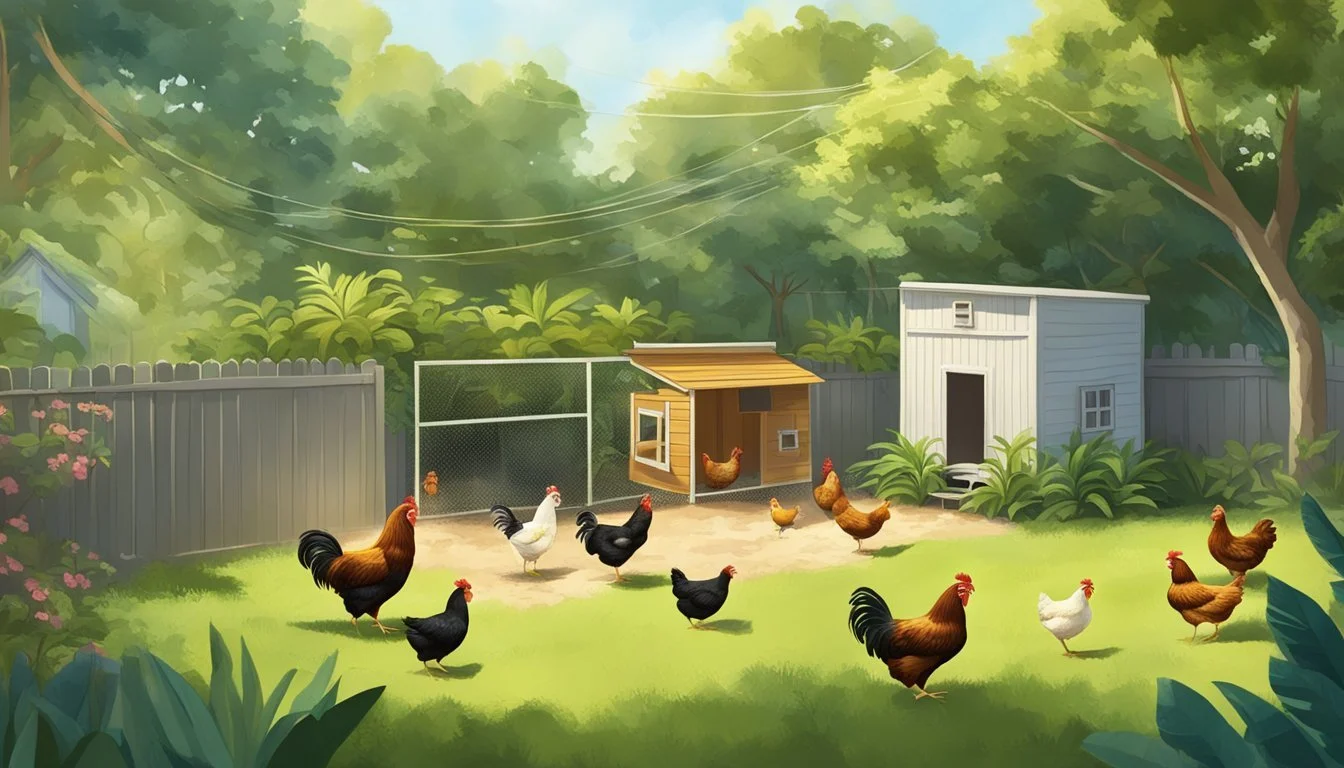Keeping Backyard Chickens in Miami, FL
Essential Tips for a Thriving Flock
The trend of raising backyard chickens has taken root in Miami, Florida, offering residents a way to reconnect with the source of their food while enjoying the pleasures of urban homesteading. The city of Miami allows individuals to keep up to 15 chickens and 30 chicks on their property, contingent on obtaining the appropriate permit. This regulation ensures a balance between the benefits of raising chickens, such as producing fresh eggs and educating families about food origins, with the need to maintain community standards.
Miami's code also specifies that roosters are prohibited within city limits to prevent noise disturbances, aligning with common urban livestock regulations focusing on minimizing the impact on surrounding neighborhoods. As for the coops, they must conform to guidelines regarding placement and size to provide adequate shelter for the chickens while adhering to city standards. Such practices underscore the importance of responsible ownership and the city's commitment to upholding the welfare of both the animals and the community.
Residents interested in pursuing backyard chicken keeping must navigate these rules with care. Understanding the local ordinances is crucial for anyone looking to integrate chickens into their Miami backyard. This promotes a harmonious relationship between chicken enthusiasts and their urban community, ensuring the well-being of the fowls and satisfaction of city dwellers.
Legal Framework for Backyard Chickens
Navigating the legal framework for keeping backyard chickens in Miami requires understanding the various city and county ordinances, compliance with state-level regulations, and being aware of zoning laws and the number of chickens allowed.
City and County Ordinances
In Miami, local ordinances dictate the specifics of raising backyard chickens. Miami-Dade County has regulations requiring residents to obtain a permit from the county health unit. This permit system ensures backyard poultry keepers comply with health and safety regulations.
State Regulations and Permits
Florida state laws provide a broader legal context within which Miami operates. While Miami adheres to state laws, it is critical for residents to understand that local ordinances may be more restrictive. Prospective poultry owners should ensure they acquire any state-mandated permits if required, in addition to local ones.
Understanding Zoning and Location Restrictions
Zoning laws play a pivotal role in determining where backyard chickens can be kept. Most residential areas within Miami are subject to zoning that impacts the legality of poultry keeping. These regulations are particularly important for residents not living in agriculturally-zoned areas and can be lenient or strict based on locality.
Number of Chickens Allowed and Rooster Bans
Specific limitations exist on the number of chickens one can keep. Roosters are often banned in residential areas due to noise concerns. It is imperative to check with Miami-Dade County for the latest limitations on poultry numbers and any ban on roosters within residential zones.
Setting Up Your Chicken Coop
Setting up a chicken coop in Miami involves crucial planning for location, design, cleanliness, and disease prevention. This ensures the health and safety of the chickens as well as adhering to local regulations.
Choosing the Right Coop Design
When selecting a coop design, one should ensure it is well-ventilated and spacious enough to prevent overcrowding. Chickens require 2-3 square feet of space per bird inside the coop, and access to an outdoor run area should provide an additional 4-5 square feet per bird. Proper ventilation is critical to maintain air quality and prevent moisture accumulation, which can lead to respiratory issues in chickens.
Location and Safety Considerations
A chicken coop in Miami must be placed at least 10 feet away from any residential structures. It is crucial to choose a location that provides shade to protect the chickens from the Florida heat, as well as protection from predators. Ensure the coop is easily accessible for feeding, cleaning, and egg collection, and that it is secured against rodents and other pests.
Maintaining Cleanliness and Disease Prevention
Sanitation is vital for preventing diseases in a backyard flock. Coops should be cleaned regularly, with all bedding materials replaced and surfaces disinfected. Establish a routine to prevent the accumulation of droppings and uneaten food, which can attract pests and promote disease. Regular health checks and adherence to local health guidelines will further aid in keeping the flock healthy.
Chicken Care and Management
Proper chicken care and management are crucial for the health and productivity of backyard chickens in Miami. From nutrition to health, and waste management, each aspect contributes significantly to the overall well-being of the flock.
Feeding and Nutrition
Nutrition serves as the foundation for a chicken's health and egg production. Chickens require a balanced diet rich in proteins, vitamins, and minerals. Specifically, they should be fed:
0-8 weeks old: A starter feed containing 18-20% protein in crumble form.
8-14 weeks old: Transition to a starter/grower feed with 16-18% protein.
15-18 weeks and beyond: A finisher or layer feed with around 16% protein.
It's important to offer continuous access to fresh, clean water and supplement their diets with grit for digestion.
Health and Veterinary Care
Chickens must be monitored for signs of distress or illness. Common health issues include respiratory problems, parasites, and injury. Preventative care could include:
Regular vaccinations as recommended by a poultry veterinarian.
Parasite control through proper coop maintenance and the use of anti-parasitic medications.
Immediate veterinary attention for any sick chickens to prevent the spread of disease.
Health checks should be a regularly scheduled part of chicken management to ensure early intervention.
Managing Waste and Pests
Effective waste management is essential to maintain a hygienic environment. A regular cleaning schedule prevents the proliferation of pests and diseases. Here are key practices:
Waste Management: Clean the coop frequently, removing droppings and replacing bedding materials to control odor and reduce ammonia levels.
Pest Control: Implementing measures such as:
Pest Control Measure Description Secure Food Containers Keep food in rodent-proof containers to discourage pests. Regular Coop Inspections Search for and seal any potential entry points for pests. Natural Predators Encourage the presence of pest predators like cats.
Pest management should be proactive to minimize impact on chicken health and productivity.
Understanding Breeds and Behavior
When keeping chickens in Miami’s heat and humidity, selecting breeds that can thrive and understanding their social behavior are crucial for a successful backyard flock.
Selecting the Right Chicken Breeds
In the tropical climate of Miami, Leghorns and Barred Plymouth Rocks are commendable choices, due to their resilience to heat. Leghorns are prolific egg layers, often producing a substantial number of white eggs. Barred Plymouth Rocks fare well in the heat and are known for their steady egg laying, offering over 200 eggs annually. Buff Orpingtons are another suitable breed, adaptable to various conditions and have a docile nature which makes them a favorite for backyard poultry enthusiasts.
Breed Egg Color Climate Suitability Average Eggs per Year Leghorn White High heat tolerance 250 - 300 Barred Plymouth Rock Brown Heat tolerant 200+ Buff Orpington Brown Adaptable to various climates 180 - 220
Behavior and Social Dynamics
Chickens exhibit a range of behaviors that are important to recognize for maintaining a harmonious backyard flock. Hens are social creatures, establishing a pecking order which dictates the social standings within a group. It's essential to monitor their interactions, especially when introducing new birds, to ensure a smooth integration. Breeds like Buff Orpingtons are known for their friendly and calm disposition, which can help in mingling with existing poultry without serious disruptions in the group’s dynamics.
Eggs and Beyond
Maintaining a flock of backyard chickens in Miami offers both personal and community benefits, especially when it comes to egg production and potential local sales. Understanding the nuances of these aspects can enhance the experience of raising chickens.
Egg Production and Collection
Peak Laying Seasons: In Miami's climate, chickens can lay eggs year-round, with optimum production occurring during the cooler months. During summer, egg-laying might decrease due to the heat.
Collection Routine: Eggs should be collected at least once a day. This not only prevents spoilage but also deters predators and discourages hens from developing the habit of egg-eating.
Egg Handling: Careful handling of the eggs is crucial. They should be cleaned, with special attention paid to not removing the natural protective coating, and refrigerated promptly to preserve freshness.
Storage and Longevity: Standard practice suggests that fresh eggs can be safe to consume for 3-5 weeks when stored correctly in a refrigerator.
Using Eggs and Supporting Local Sales
Personal Consumption: Many residents raise chickens for their own consumption. Fresh eggs from backyard chickens are often considered superior in taste and nutritional content.
Local Egg Sales: Local regulations permit the sale of eggs, but one must adhere to health and safety regulations. This can create a viable market for selling excess eggs within the community.
Health Regulations: Backyard chicken owners looking to sell eggs must ensure compliance with local health and safety regulations, which may include acquiring permits and adhering to packaging and labeling requirements.
Community Impact: The local sale of backyard chicken eggs can contribute to the community's economy and promote sustainable living practices.
Community and Legal Support
Navigating the regulations of backyard chicken keeping in Miami demands an understanding of local laws, community guidelines, and available resources. The section below outlines the importance of adhering to Homeowners Association Guidelines, the significance of community engagement, and the avenues to obtain additional information.
Homeowners Association Guidelines
When contemplating the keeping of backyard chickens in Miami, it is crucial for residents to consult their Homeowners Association (HOA) to verify whether there are specific community guidelines that must be followed. Some associations may have restrictions or additional requirements separate from city ordinances. For example, distances from property lines and neighbor consent might be addressed by HOAs in Miami.
Engaging with the Local Community
Effective communication and cooperation with neighbors can be beneficial when keeping backyard chickens. Residents are encouraged to engage with their local community, through meetings or forums, to foster understanding and address any concerns. By doing so, the community can work together to ensure that backyard chicken practices are not disruptive and are in consensus with neighborhood expectations.
Resources and Additional Information
Residents can access reliable information and support regarding backyard chicken laws from multiple sources. City Hall is a primary contact for legal queries, with detailed municipal codes available for residents. Information specific to areas such as Tampa, Orange County, Fort Lauderdale, Hialeah, Jacksonville, Orlando, and Tallahassee might have peculiar guidelines, which can be found on their respective city or county websites or direct inquiries. Additional resources include:
Local agriculture extension offices
Animal welfare organizations
Community farming groups
These entities can offer insight, workshops, and guidance to both seasoned and prospective chicken keepers within Miami.








